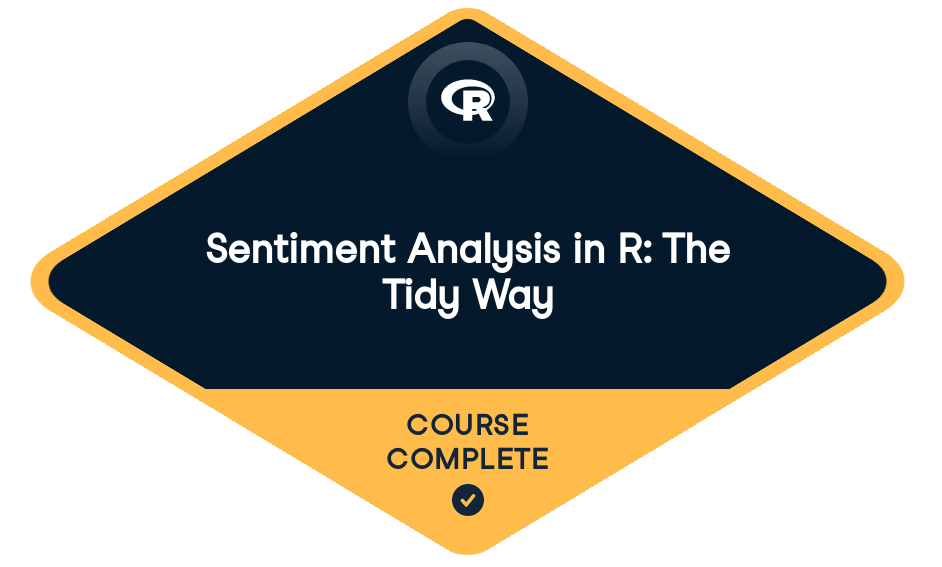
Loved by learners at thousands of companies
Course Description
Text datasets are diverse and ubiquitous, and sentiment analysis provides an approach to understand the attitudes and opinions expressed in these texts. In this course, you will develop your text mining skills using tidy data principles. You will apply these skills by performing sentiment analysis in several case studies, on text data from Twitter to TV news to Shakespeare. These case studies will allow you to practice important data handling skills, learn about the ways sentiment analysis can be applied, and extract relevant insights from real-world data.
Training 2 or more people?
Get your team access to the full DataCamp platform, including all the features.- 1
Tweets across the United States
FreeIn this chapter you will implement sentiment analysis using tidy data principles using geocoded Twitter data.
Sentiment analysis and tidy tools50 xpSentiment lexicons100 xpWords in lexicons50 xpSentiment analysis via inner join50 xpImplement an inner join100 xpUnderstanding an inner join50 xpUsing dplyr verbs to analyze sentiment analysis results50 xpWhat are the most common sadness words?100 xpWhat are the most common joy words?100 xpLooking at differences by state50 xpDo people in different states use different words?100 xpWhich states have the most positive Twitter users?100 xp - 2
Shakespeare gets Sentimental
Your next real-world text exploration uses tragedies and comedies by Shakespeare to show how sentiment analysis can lead to insight into differences in word use. You will learn how to transform raw text into a tidy format for further analysis.
Tidying Shakespearean plays50 xpTo be, or not to be100 xpUnnesting from text to word100 xpSentiment analysis of Shakespeare100 xpUsing count and mutate50 xpTragedy or comedy?100 xpMost common positive and negative words100 xpWhich word was misidentified?50 xpSentiment contributions by individual words50 xpWord contributions by play100 xpCalculating a contribution score100 xpAlas, poor Yorick!100 xpWhich words are important in each play?50 xpSentiment changes through a play100 xpCalculating net sentiment100 xpVisualizing narrative arcs100 xp - 3
Analyzing TV News
Text analysis using tidy principles can be applied to diverse kinds of text, and in this chapter, you will explore a dataset of closed captioning from television news. You will apply the skills you have learned so far to explore how different stations report on a topic with different words, and how sentiment changes with time.
That's the way it is50 xpTidying TV news100 xpCounting totals100 xpSentiment analysis of TV news100 xpComparing TV stations50 xpWhich station uses the most positive or negative words?100 xpWhich words contribute to the sentiment scores?100 xpWord choice and TV station100 xpSentiment changes with time50 xpVisualizing sentiment over time100 xpWord changes over time100 xp - 4
Singing a Happy Song (or Sad?!)
In this final chapter on sentiment analysis using tidy principles, you will explore pop song lyrics that have topped the charts from the 1960s to today. You will apply all the techniques we have explored together so far, and use linear modeling to find what the sentiment of song lyrics can predict.
Ranking pop songs through the years50 xpTidying song lyrics100 xpCalculating total words per song100 xpSentiment analysis on song lyrics100 xpThe most positive and negative songs100 xpConnecting sentiment to other quantities50 xpSentiment and Billboard rank100 xpMore on Billboard rank and sentiment scores100 xpMoving from song rank to year50 xpSentiment scores by year100 xpModeling negative sentiment100 xpModeling positive sentiment100 xpHow is sentiment in pop songs changing over the decades?50 xpWrapping up50 xp
Training 2 or more people?
Get your team access to the full DataCamp platform, including all the features.datasets
Text spoken on TV news programsGeocoded Twitter dataSix of Shakespeare's playsLyrics from pop songs over the last 50 yearscollaborators

DataCamp Content Creator
See MoreCourse Instructor
DataCamp offers interactive R, Python, Spreadsheets, SQL and shell courses. All on topics in data science, statistics, and machine learning. Learn from a team of expert teachers in the comfort of your browser with video lessons and fun coding challenges and projects.
Join over 18 million learners and start Sentiment Analysis in R: The Tidy Way today!
Create Your Free Account
or
By continuing, you accept our Terms of Use, our Privacy Policy and that your data is stored in the USA.